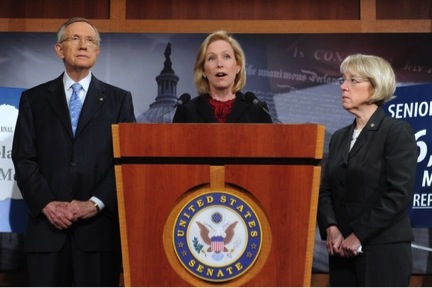A More Logical Plan Than “Obamacare”
Stanley Feld M.D.,FACP,MACE
I do not think President Obama understands basic healthcare economics. Patients and physicians will always drive spending for healthcare. The government will not be able to control spending centrally.
Forty to sixty cents of every healthcare dollar is spent on administrative costs. CMS claims that Medicare spends only 2.5% on administrative services. This 2.5% is the cost for CMS to outsource Medicare coverage to the healthcare insurance industry.
The healthcare insurance industry takes 40% to 60% of every healthcare dollar for their administrative fees. The law says they can only take 15% out of every dollar for administrative fees. Eighty five percent of the premium dollar must go to patient care.
The problem is the 85% includes many fees that are, in reality, administrative expenses such as certifying physicians for their plans and insurance sales fees among others. There is a profit margin for each of these “expenses.” President Obama has permitted these administrative fees to be included in the 85% category for direct healthcare costs.
Physicians get 15% and hospitals get 20% of every healthcare dollar. Where does the rest of the money go?
Forty percent gets taken off the top by the healthcare insurance industry. A good place to start is by setting up a system that creates competition among the healthcare insurance companies.
The government always blames physicians for the waste. Physicians and patients drive healthcare expenses. Waste occurs as a result of perverse incentives and middlemen abuse. All the stakeholders are to blame. The healthcare insurance industry generates the most waste. Defensive medicine is the second leading cause of waste. Legislation using common sense could eliminate most of this waste.
"A 2005 report by the National Academy of Engineering and the Institute of Medicine found that 30-40 cents of every dollar spent on health care are spent on costs associated with "overuse, underuse, misuse, duplication, system failures, unnecessary repetition, poor communication, and inefficiency. Medicare is especially vulnerable to waste, fraud and abuse.”
Medicare spending must be decreased. The best way to decrease the spending is to provide incentives for seniors to drive the system rather than the system driving seniors.
“Unfortunately, the debate on Capitol Hill and in the media is too often fueled by partisan fear mongering instead of a thoughtful examination of the facts.”
No amount of price cutting or central-government dictates will mitigate these problems.
A consumer (seniors) driven healthcare system providing incentives for providers and patients is the only way to fix the system.
Accountable Care Organizations (ACOs) are being proposed and organized to harness the spending of the fee for service systems.
ACOs are systems in which doctors and hospitals team up to offer coordinated care. Both are held accountable for cost and quality in a disguised capitation system. “Quality” is not effectively measured.
Hospital systems and physicians have long had an adversarial relationship because hospital systems have leveraged its brick and motor value off the intellectual property and mechanical skills of physicians.
More and more physicians are realizing this fact. Physicians are building their own hospitals and outpatient surgical clinics. Physicians are consciously or unconsciously resistant to hospital systems dividing the money and participating in the reimbursement sharing judgments.
Neither group wants to be at risk for “poor outcomes” that might be the patients’ fault.
The incentives to form ACOs are too weak. The regulations are 400 pages too long and complicated. Physicians do not have the time or money to fully understand the regulations. “Trust me” does not work anymore. The major hospital systems have backed out of forming ACOs under the regulations because they put the hospital system at too great a risk.
Paul Ryan’s plan of “premium support” can potentially encourage formation of Accountable Care Organizations The ACOs have to be attractive enough for patients to choose to join them. Hospital systems would have to be successful in organizing them. Ryan’s plan is a “managed competition model.” The government would make defined contributions for beneficiaries depending on the beneficiaries’ means. The subsidy would be a total subsidy for the poor and a sliding scale subsidy for others.
Beneficiaries would have a choice from a variety of health plans with no discrimination based on health status or wealth. Standard coverage contracts understandable by ordinary people would be required to make comparisons possible. Internet FAQs would be made available.
Competition for consumer (seniors) business would drive health plans to innovate in ways that would cut waste and improve “quality.” The use of well-designed healthcare insurance exchanges would drastically reduce healthcare insurance company marketing costs. The completion by healthcare insurance companies in effective healthcare insurance exchanges could result in healthcare insurance companies not taking 40% off top as they currently do. The system could be set up so that consumers could buy the insurance across state lines.
The Ryan plan does not deal with defensive medicine. States could easily be presented with an ideal tort reform model to adopt or modify. In Texas the model is not ideal but it is effective and would be effective nationally. If a model included a “loser pays” clause it would decrease frivolous law suits and decrease defensive medicine testing dramatically. In most instances physicians do not receive increased compensation for the increase in testing. Therefore the motivation is not testing simply to make more money.
President Obama needs to understand the basics of healthcare economics before he goes on and totally destroys the healthcare system.
The opinions expressed in the blog “Repairing The Healthcare System” are, mine and mine alone.

cukrzyca przyczyny
Repairing the Healthcare System: Organized Medicine Is Out Of Touch With Practicing Physicians.